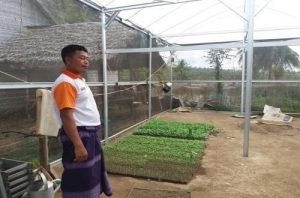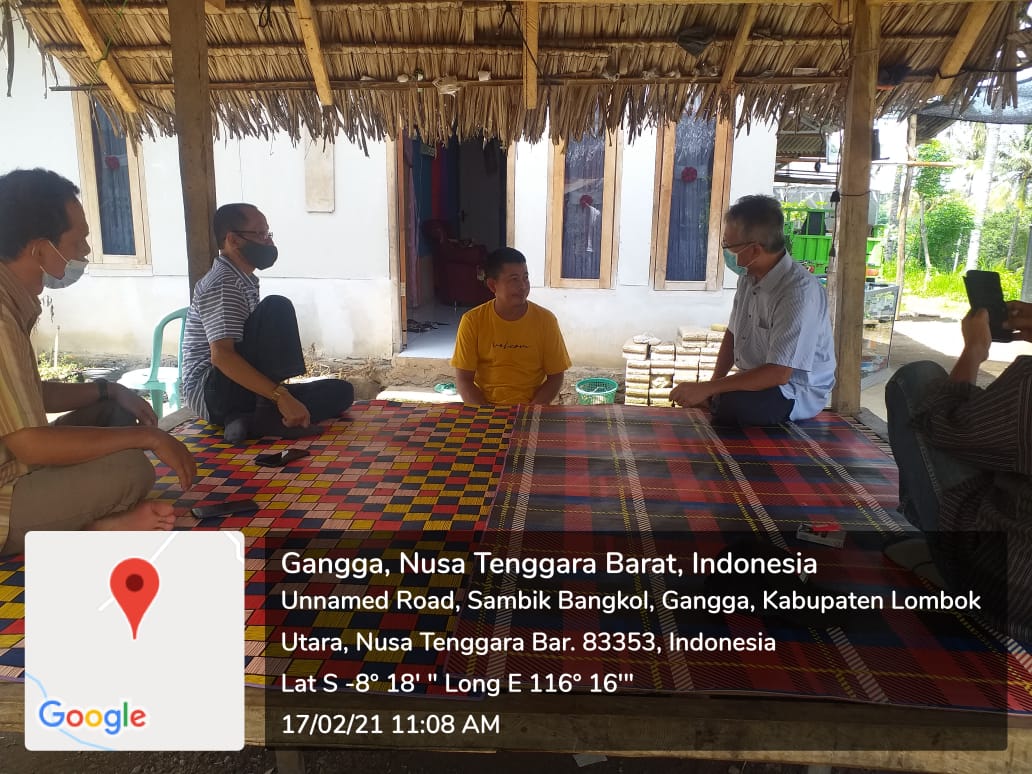cesfarms.unram.ac.id, North Lombok Regency. (17th February 2021) – Field visit Report By Muktasam and Nurrachman.

Introduction
The visit to the North Lombok LPAH was carried out on Wednesday, February 17, 2021, starting from Mataram at around 09.00 and arriving at Pk Rahmat’s house, at the Lokok Bata Horticultural Farmer Group – Pendua Village around 10.30.
Together with Pk Deden, Pk Lukman and Pk Mulyadi met and discussed with Pk Rahmat at Pk Rahmat’s Berugak. The following are the agenda for discussion at the meeting:
- Obtain information and reports from Pk Rahmat about the development of the horticultural seedling business and the chemical business for pest and disease control, as a collaboration between LPAH and the Lokok Bata farmer group or Pk Rahmat.
- Provide input related to problems and business development plans for horticultural seedling business and others.
Current Businesses, Strengthening Strategies, and Business Development Directions
On the basis of the 2 agendas above, the following data, information and results are obtained:
- The nursery business activities managed by Pk Rahmat have been going well and smoothly. Seed procurement and marketing services are quite smooth, and can even serve seed requests by farmers from outside the village.
- Marketing of seedlings was also carried out in collaboration with Bu Yus and others, and there was a slight problem with prices. Pk Rahmat hopes that the seedling distributors who come from Pk Rahmat do not sell their seedlings at too high price, for example, only Rp. 300 per seeding and not Rp. 500 per seedling.
- The management of the nursery business by Pk Rahmat is quite good because it develops the business with “market sensitivity”. What the market demands, is what Pk Rahmat produces and sell – seeds and chemicals. At this time Pk Rahmat has collaborated with the Village Government in providing horticultural seedlings which are distributed to the community using the Village Fund.
- In order to motivate Pk Rahmat in developing his business, the Cesfarm Team represented by Pk Muktasam and Pk Deden provided illustrations or shared stories about how poultry companies such as Charoen Pokphand (CP) – Thailand-based agribusiness transformed from a feed business into a large poultry business that was integrated horizontally and vertically. This company was initially only in the feed business, and then due to the sensitivity of the business of its managers – in response to market demand, other businesses grew such as the business of poultry seeds (Day Old Chick or DOC), medicines, meat, eggs, partnerships in the procurement of raw materials, partnerships in broiler Production, minimarkets, and others. In 2004 CP controlled the poultry market in 20 countries outside Thailand, including Indonesia, even to Lombok.
- This attitude seems to have existed in Pk Rahmat’s soul, and the Team only added new stories and inspirations about the success stories of business development in agriculture (agribusiness). Adding to the success story of this business, Pk Muktasam also gave an overview of how Mas Min, who was a meatball maker at Karang Taruna kampong, went on to become the manager of the Timbul Rejeki Bakso House on Jln Airlangga – Mataram. This meatball business now controls other businesses in the meatball field, from milling meat to distributing soy sauce, sauces, noodles and others.
- Pk Rahmat’s seedling business will expand into other businesses such as planting partnerships, horticultural consulting services (there will be a Horti Clinic at Pk Rahmat’s place), and it is possible that there are seedling house development efforts in other locations. Information from Pk Rahmat, there has been an offer from someone in another village and sub-district for Pk Rahmat to cooperate in building a seedling hause – Pk Rahmat’s choice is as a business owner or as a paid consultant for his services.
- As part of his promotion and social responsibility efforts, Pk Rahmat sincerely distributed the remaining seedlings in his seedling house to the surrounding farmers – instead of getting old and not being used. This strategy has 3 advantages, namely: (i) as part of the social responsibility of the business it is developing, (ii) part of the promotion of products such as seedlings in the hope that one day the farmers who receive the seedlings will come again to shop for seeds, and (iii) ) it is an opportunity for “profit sharing” partnerships where the results obtained at harvest can be shared between farmers and Pk Rahmat – there are already among the assisted farmers that they have harvested with satisfactory results.
Closing
The nursery business is currently running quite well and progressing quite satisfactorily. The seedling house, which was originally only one unit, has now become 2 units with the ability to produce seedlings which has also increased. Other assets in the horticulture business have also increased, such as the means of transporting seedlings, which previously only used a motorbike, now there is a three-wheeled motor that can be used to transport larger quantities of seedlings. The absorption of labor has also begun to be felt, especially when the demand for seedlings has increased – while currently there are around 6 – 8 workers.
In line with the development of the seedling business and the demand for other production facilities, the nursery business which is managed by Pk Rahmat has started to manage a new business branch, namely the agricultural pharmaceuticals business while still paying attention to the concepts of sustainability and products that are safe for human health and the environment. .
The nursery business manager has demonstrated his business sensitivity so that he has a clear direction to move forward. The concept of “serve with a sincere heart, competitive prices with little profit but from many consumers” is the key to strengthening and expanding Pk Rahmat’s nursery business. Horticultural clinics are part of providing more services to seedling consumers.

